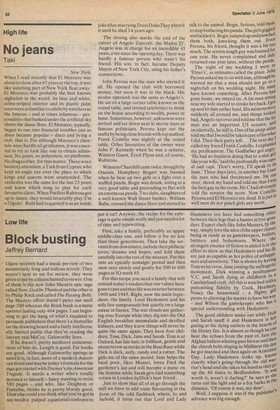Low life
Block busting
Jeffrey Bernard
I have recently had a sneak preview of two monstrously long and tedious novels. They weren't sent to me for review, they were given to me by a disenc ha nted reviewer. One of them is the new John Masters epic saga called Now, God be Thanked and the other is by Philip Rock and called The Passing Bells. The Masters effort doesn't peter out until page 589 whereas the Rock book is a mere sprinter lasting only 464 pages. I am beginning to get the hang of what's required to persuade publishers that there's a bestseller on the drawing board and a fairly intellectually limited public that they're reading the literary real McCoy. Galsworthy lives.
If he doesn't, pretty mediocre reincarnations of him do. Length is good. Fat books are good. Although Galsworthy springs to mind it is, in fact, more of a modern American trend and maybe today's formula for the saga got started with Dreiser'sAn American Tragedy. It needs a writer who's totally devoted to himself — fancy wanting to write 589 pages — and who, like Deighton or Forsythe, thinks he is pretty bloody good. How else could you think what you've got to say needs a pulped equatorial rainforest to put it on? Anyway, the recipe for the epicsaga is quite simple really and just needs a lot of time and typewriting.
First, take a family, preferably an upper middle-class one, and follow it for no less than three generations. Then take the servants from downstairs, include theirpathetic loves, dreams and hopes, and fold them carefully into the rest of the mixture. Put this into an epically nostalgic period and then stew very slowly and gently for 500 to 600 pages at IQ mark 65.
For this recipe you need a family that will remind today's readers that our values have gone to pot and that life was sweeter between 1900 and 1945. Right, now the main ingredient, the family. Lord Haslemere and his wife live sumptuously but quietly on a large estate in Sussex. The war clouds are gathering over Europe while they dig into the Old English breakfast marmalade and devilled kidneys, and they know things will never be quite the same again. They have four children, Tom, Dick, Jane and Sarah. Tom is at Oxford, has fair hair, is brilliant, gentle and about to row as stroke in the Boat Race while Dick is dark, surly, randy and a rotter. The girls are of the same mould. Jane helps the local poor, likes Mozart, loves Fred the gardener's lad and will become a nurse on the Somme while Sarah gets laid something rotten in London byDick's best friend.
Just to show that all of us go through the mill we have to add some flavouring in the form of the odd flashback where, lo and behold, it turns out that Lord and Lady Haslemere too have had something other between their legs than a hunter in bye-rae days. Expert chefs like John Masters, by the way, simply love the idea of the upper classes being as randy as us gamekeepers, butlers' batmen and bohemians. Where the strongest essence of fiction is added is in the effort to show us that Haslemere and his ilk are just as capable as hoi polloi of unhapPt' ness and sensitivity. This is shown by having Tom write verse, Jane joining the suffragette movement, Dick winning a posthumous V.C. and Sarah dying in childbirth in 3 Cumberland croft. All this is watched with a patronising fidelity by Cook, Heathers: Nancy the housemaid — a flighty girl prone to allowing the master to have his waY — and Wilson the gamekeeper who has a special understanding with Haslemere. The good children make -Out while Die,lc and Sarah snuff it and Haslemere is lett, gazing at the dying embers in the hearth nt the library fire. It is almost as though he can hear the echoes from the past of, first the 'Afghan bullets whining past his ear and then the church bells ringing in Midhurst the daY he got married and then again on Armistice Day. Lady Haslemere looks up, knows exactly what's going through the old warrior's head and she takes his hand as they up the 40 stairs to Bedfordshire. 'It worth it, wasn't it darling?' he says as sne turns out the light and as a fox barks in the distance. Of course it was, my dear'. Well, I suppose it was if the publisher's advance was big enough.






































 Previous page
Previous page